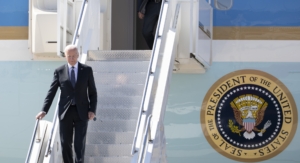OPEC’s Diminished Cartel, the Constitutionality of Twitter Blocking, and the Declining Business Birth Rate
Here’s What You Need To Know
After hitting all-time production highs in 2016, this January, the 14-nation Organization of the Petroleum Exporting Countries (OPEC) – as well as several non-OPEC oil producers – agreed to cut oil output by 1.8 million barrels per day. Although oil prices rose slightly above $50 following the agreement, in May they fell into the mid $40s and have stayed in this range since then. Only three years ago, prices were as high as $90 a barrel.
This past Monday, the cartel met in Russia to address the failure of this agreement. Yet, despite more tough talk, including pledges to cap production from Saudi Arabia and Nigeria, oil prices budged only modestly.
Only a few decades ago, OPEC’s oil embargo brought the U.S. economy to a standstill. Now the organization’s ability to influence the energy market has greatly diminished, and here are the main reasons why:
Subscribe to Receive Insights
"*" indicates required fields
- It’s The Fracking: Fracking allows the recovery of gas and oil from shale rock through the injection of water, sand, and chemicals. In recent years, the combination of this technology with horizontal drilling and other technological developments has made it possible to reach previously inaccessible fuel. These advancements have resulted in surging U.S. petroleum production. U.S. production increases in 2016 alone were estimated to cost OPEC countries $76 billion. Other non-OPEC countries, such as Canada, China, and Argentina, have also increased production from fracking, although not to nearly the same extent as the U.S. As the output of these countries rises, OPEC’s share of the overall market decreases, naturally hampering its ability to manipulate prices.
- It’s The Exemptions: In the deal earlier this year, OPEC exempted Libya and Nigeria from any cuts in production because of the economic challenges both countries currently face from internal conflicts. However, production in both countries has surged recently. In May, Libya’s output increased 210,000 barrels a day from the previous month to 760,000, while Nigeria’s increased from 100,000 to 1.7 million. OPEC made slight progress on this front during the Russia summit earlier this week by securing a pledge from Nigeria to eventually cap its production. However, this concession will only go into effect once Nigeria can sustain an output of 1.8 million barrels a day, which likely will not occur for some time.
- It’s The Cheating: Cartel agreements to limit output are much easier to secure in principle than enforce in practice. According to J.P. Morgan Chase & Co., Iraq and the United Arab Emirates are not complying with their pledges. In addition, Ecuador recently announced they would not abide by OPEC’s decision because of budget challenges. Following the Russia summit, OPEC released a statement demanding “all participating producing countries must promptly reach full conformity.” But it appears unlikely this type of shaming will have a major effect.
Although OPEC can have some impact on moving prices – at least in the short-term – the cartel has clear limitations. OPEC sends mixed messages about its production policies, has no way to enforce member countries to follow their rules, and its share of the petroleum market continues to decline. This will not only have global economic impacts in the months to come; watch for potentially significant political impacts within and among each of the member nations in the Middle East.
News You Can Use
HOW AI CAN MAKE FAKE NEWS LOOK REAL
The proliferation of fake news through social media and other platforms has been a growing concern in recent years, and a recent University of Washington experiment shows how advancements in artificial intelligence (AI) could exacerbate it. Researchers used algorithms to manipulate the mouth movements of President Obama in several different videos, syncing those mouth movements with various audio pieces.While being able to alter a person’s lip movements to match an audio track is nothing new, this development trains itself to match any potential variety of sounds based off existing videos of that person. This technology could be used by fake news disseminators to make videos of an individual saying something out of context or, through an impersonator, to say something they may have never said at all. As the sophistication of these hoaxes increases, even mainstream media outlets may have difficulty distinguishing real from fake, and may have to adjust their processes to avoid amplifying false content.
CAN DEMS’ DEFICIENCIES BE FIXED WITH DIGITAL?
THE CONSTITUTIONALITY OF THE TWITTER BLOCK
The Knight First Amendment Institute recently filed a lawsuit against President Trump in a Manhattan federal court, claiming top government officials blocking other users on Twitter could be a violation of the first amendment. The group argues that when the President and other high ranking members of his Administration block members of the public from seeing and interacting with their Twitter accounts, this blocks citizens from participating in an open public forum, and therefore infringes on their right to free speech and expression.The plaintiffs compare these social media accounts to town halls and open school board meetings that individuals cannot legally be excluded from because they hold dissenting viewpoints. If the suit is successful, the precedent could raise further questions about when the social media presence of a public official is private and when it can be subject to public records requests.
THE DECLINING BUSINESS BIRTH RATE
A new study from the Economic Innovation Group suggests the falling rate of business births may at least partially explain many of our current economic woes like decliningworkforce participation and stagnant wages. Their analysis shows the number of U.S. companies going out of business was greater than the number of businesses being created for the first time on record during the Great Recession.Even in the recovery period from 2010 to 2014, the firm birth rate, or the rate at which new businesses enter the marketplace, was nearly five times lower than the recovery in the mid-1980s. The conclusion is similar to a different study we noted in March, which found that the firm birth rate has been declining every year since 2008. The findings once again underscore the importance of implementing a policy framework that encourages investment and entrepreneurship.
NYC’S PET-SITTING CRIME SPREE
While demand for pet sitters is growing nationally, New York City is still enforcing a largely unknown rule banning anyone from taking money to care for an animal outside a licensed kennel. At least two apartment residents were fined $1,000 for the “offense” last year, and the City has warned the creators of an app connecting pet owners with pet-sitters that they are breaking the law.The Health Department argues the regulation is necessary so that they can inspect the facilities to ensure they are sanitary and the animals are being treated well. But the rule likely jeopardizes the health and safety of pets by making it more difficult for owners to find care. The ban is another example of how bureaucracies can become mindless when legislators fail to update antiquated rules.



